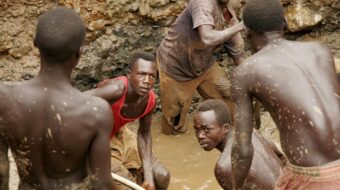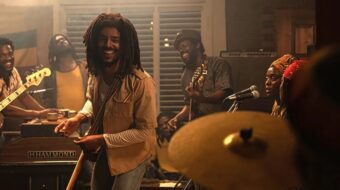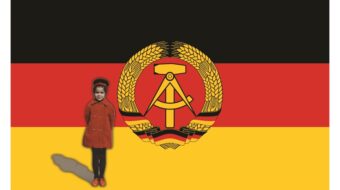On Feb. 26, Senegal held presidential elections. According to election results published yesterday, the incumbent, Abdoulaye Wade, will be forced into a runoff. But what exactly is being decided in terms of this African country’s future is hard to say.
Senegal, population about 13 million, got its independence from France in 1960. Leopold Senghor, its first president, was an outstanding figure of African culture and letters, and defined himself as a socialist; his ‘African socialism’ de-emphasized class struggle in favor of African communalist traditions. Senghor was deeply attached to France, where he ultimately retired to die.
Senghor’s first Prime Minister, on the other hand, the fiery leftist Mamadou Dia, strongly condemned French control over independent Senegal and imperialism in general. Senghor, accusing Dia of coup plotting, eventually managed to marginalize him. Senghor retired in 1980 and was succeeded by Abdou Diof, also of the not-very-socialist Socialist Party.
Abdoulaye Wade, of the Senegalese Democratic Party, defeated Diof in the presidential elections of 2000, running on a platform of opening up the political system. He was supported in this by, among others, the main party of the left, the Party of Independence and Labor. However, it soon became clear that Wade, although he also opened up trade with China, was going to go even further than Diop in implementing neo-liberal policies, and the left broke with him. Wade, who was re-elected in 2007, engineered a change in the Constitution, which limited presidents to two terms.
But subsequently, he thought better of this and decided to go ahead and run again in 2012. Ignoring public outrage, he got the Supreme Court, all of whose members he had appointed, to agree, on the theory that, as the term limits were imposed when he was already president, they would not apply to him. The determination of Wade to run in spite of the term limits, plus the suspicion that he his planning to have his son, Karim, succeed him, explains part of the anger against him, but not all.
Food prices have been rising recently. Although not the poorest among the former French colonies in Africa, Senegal is poor, with a per capita Gross Domestic Product adjusted for “Purchasing Power Parity” (GDP-PPP) of about $1,700 per year. Senegal’s exports include peanuts, fish, cotton, and phosphates, and it gets considerable income from tourism. But industry and agriculture are underdeveloped and Senegal has to import many things, including much of its food.
Senegal is one of the countries of Africa that does not control its own currency. The CFA Franc is basically controlled by France, a fact which set off a panic in late 2011 when it was rumored that the currency would be devalued by Paris, which would also have made imports much more expensive. So far, however, the rumored devaluation has not happened.
Corruption is another problem. There is anger with Wade because of the construction of a gigantic statue, at 164 feet tall larger than the Statue of Liberty in New York, called “African Renaissance.” Senegal is mostly Muslim and the statue offended Islamic sensibilities but was also seen as a “monumental” waste of resources and a sign of Wade’s increasing megalomania. Wade’s age itself – he is officially 86 but may be considerably older – is another complaint. And there is a long simmering revolt in the southern Casamance region.
Going into the elections, a demand that Wade withdraw his candidacy came up against a stone wall. The best known anti-Wade presidential candidate, popular singer Youssou N’Dour, was disqualified on technicalities, leaving 13 other candidates plus Wade. No fewer than four of the other candidates had held the post of prime minister under Wade! The opposition alliance, called M23, includes the left but also people whose goals seem to be personal rather than ideological.
There were protests, leading to at least six deaths, in the weeks leading to the election. An effort by former Nigerian President Olugesun Obasanjo to mediate the dispute was shot down by both sides.
According to election officials, Wade, with 34.82 percent of the vote fell far short of the 50 percent he needed, and will have to go to a runoff. He even lost heavily in his middle class home district in Dakar, the capital. The runner up, with 26.57 percent, who will face Wade in a runoff, is Macky Sall, of the Alliance for the Republic, who used to be Wade’s prime minister and then president of the parliament until they had a falling out in 2007 when Sall tried to organize an investigation of Karim Wade.
Speaking to the press on Monday, Macky Sall emphasized that Wade’s failure to avoid a runoff is a vindication of the opposition slogans “touche pas a ma constitucion” (“don’t touch my constitution”) and “pas de troisieme mandat pour Wade” (“no third term for Wade”), rather than anything having to do with improving the lives of the Senegalese, except for a vague promise to bring food prices down.
Sall may well win, because he will have most other forces that ran in the election behind him. What this bodes for the people of Senegal is another matter.

MOST POPULAR TODAY


Zionist organizations leading campaign to stop ceasefire resolutions in D.C. area

Communist Karol Cariola elected president of Chile’s legislature

Afghanistan’s socialist years: The promising future killed off by U.S. imperialism

High Court essentially bans demonstrations, freedom of assembly in Deep South






Comments